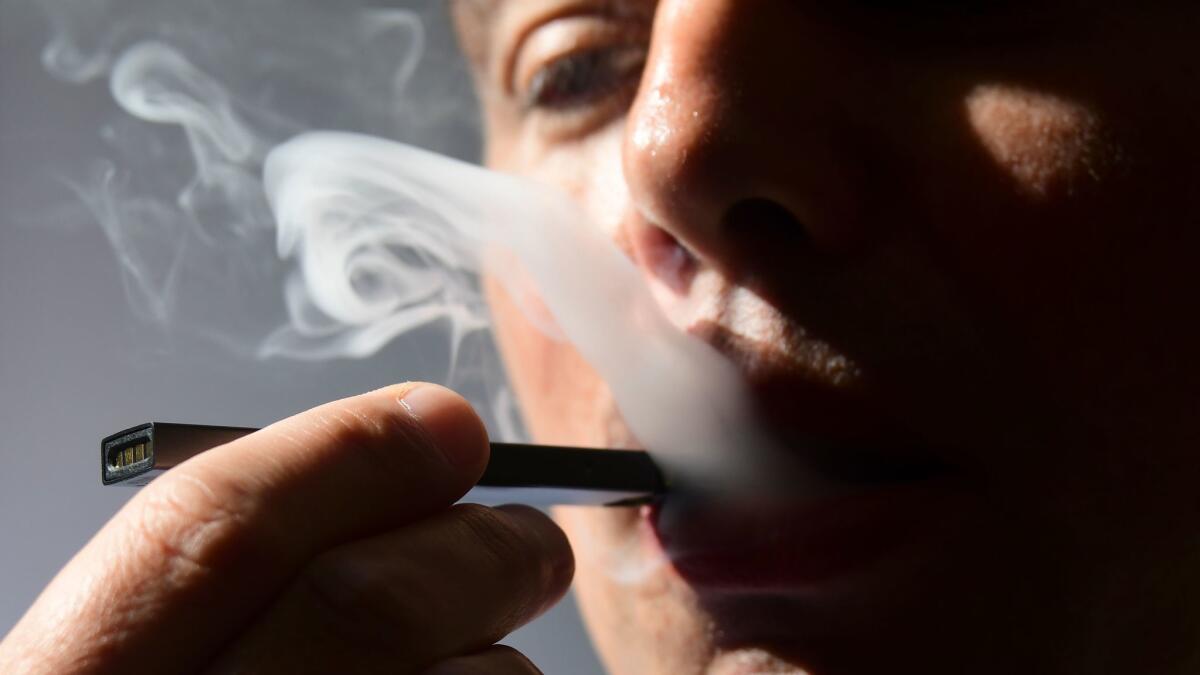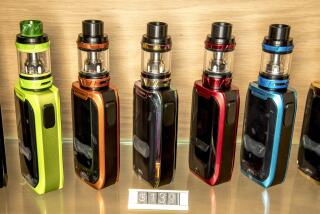Altria-Juul deal gets FDA scrutiny as regulators prepare e-cigarette restrictions

Tobacco giant Altria Group Inc.’s efforts to gain a toehold in the burgeoning e-cigarette market are facing scrutiny, as a top U.S. regulator signaled that curbs on sales of some vaping products are imminent.
The Food and Drug Administration is concerned that Altria’s $12.8-billion stake in e-cigarette start-up Juul Labs Inc. contradicts commitments both companies have made to address what health officials have called an epidemic of youth vaping.
FDA Commissioner Scott Gottlieb wrote to the companies Friday and asked to talk with them about “public statements that seem inconsistent” with vows they made to the agency last year to combat nicotine use by minors. Youth adoption of e-cigarettes has surged in the last year, provoking calls for action from parents, public-health advocates and lawmakers.
The commissioner also said he expects to make good in the next 30 days on a pledge he made in November to issue draft rules restricting sales of most flavored e-cigarette products to vaping shops and online retailers that verify a purchaser’s age.
Gottlieb insisted last year that e-cigarette manufacturers take steps to keep their products from being used by children. Many vaping pods come in fruit or candy flavors. Some have packaging resembling juice boxes or whipped cream.
Altria said in a letter sent to Gottlieb in October that it would temporarily pull its flavored pod-based products from stores.
“We believe that pod-based products significantly contribute to the rise in youth use of e-vapor products,” Altria Chief Executive Howard Willard III wrote in the letter, less than two months before the company, which also sells Marlboro cigarettes, said it would buy a stake in Juul.
“My question is, what changed?” Gottlieb said in an interview with Bloomberg.
Willard said in the October letter to the FDA that the company believed flavored pods could help adult smokers transition away from traditional cigarettes and didn’t think it had a problem with youth access or use of its products.
Juul is a pod-based product with the flavored nicotine sold as a separate cartridge. Known for a sleek device that can be held in the palm of the hand, it’s popular among youth and young adults, including people who aren’t prior tobacco users. San Francisco-based Juul Labs is one of the most richly valued start-ups in the country, worth $38 billion after Altria’s investment in December.
Vaping among high school students rose 78% between 2017 and 2018, to 3 million, according to the FDA and the Centers for Disease Control and Prevention. About 4.9 million middle and high school students said they’d used any tobacco product in the last 30 days, according to preliminary results of the 2018 National Youth Tobacco Survey.
“If youth use goes up 40% or 50% this year we’re going to be having a very different discussion come this summer or fall,” Gottlieb said in the interview. He has threatened to ban all sales of flavored e-cigarettes if underage use isn’t controlled.
Juul said in November that it would shut down its social-media accounts and stop selling the flavored nicotine pods in stores, though retailers would be able to sell any remaining stock. They’re still available online in flavors such as mango and cucumber. Gottlieb wants to know if the company plans to reintroduce them to the brick-and-mortar market before the FDA’s sales restrictions are finalized.
The letters to Altria and Juul follow a move Thursday by the commissioner to single out Walgreens Boots Alliance Inc. for being the biggest violator of prohibitions on youth tobacco sales. Walgreens said it has taken steps to crack down on such sales. Gottlieb had previously eased restrictions on e-cigarettes as he expressed hope they would offer adult smokers a way to quit but he has reversed course given the rise in vaping among children and teens.
“I am aware of deeply concerning data showing that youth use of Juul products represents a significant proportion of the overall use of e-cigarette products by children,” Gottlieb wrote to the chief executives of Altria and Juul. “I have no reason to believe these youth patterns of use are abating in the near term, and they certainly do not appear to be reversing.”
Juul has an estimated 70% share of the $3 billion e-cigarette market, according to a Bloomberg Intelligence analysis of data from market researcher IRI.
Altria has touted the deal with Juul as further helping the company move adult smokers to products that may carry less health risk, such as a device called IQOS that Altria is seeking FDA clearance to sell. At the time of the Altria-Juul deal, executives said if concerns about youth smoking aren’t resolved, it could put the entire vaping business at risk, even for adults.
Altria has said it wants to raise the minimum age to buy tobacco products to 21.






